
Korematsu v. United States: Japanese-American Internment Camps

The story of Fred Korematsu. 22 years old, born in the United States of Japanese parents. After the start of WWII he was thrown out of his union because of his ancestry. Result; he lost his job as a shipyard welder. Speaks almost no Japanese.
He was ordered to leave California by the Army and he refused. The people were being relocated (and not charged with any crime). He changed the name on his identification card and had plastic surgery on his face. He was arrested on a street corner in his hometown.
California, Oregon and Washington laws: Japanese could not marry white citizens. They could not use public swimming pools. They could not live in certain neighborhoods. They could not own land. They could not rent a piece of land for more than 3 years.
Congressman John Rankin: "Once a Jap, always a Jap...You cannot...make him the same as a white man any more than you can reverse the laws of nature."
Executive Order 9066, signed on February 19, 1942, "gave the military commander the power to select certain parts of the West Coast and call them military areas." All people who were deemed a threat to national security were to be kept out of those areas.
March 2, 1942: Proclamation 1. California, Washington, Oregon and Arizona were declared military areas.
March 21, 1942: Public Law 503. It was a federal crime to disobey any orders of General DeWitt, in charge of protecting the west coast against attack by Japan.
Three days later: 8 P.M. to 6 A.M. curfew declared for Americans of German, Italian and Japanese ancestry in the military areas. Curfew violation meant being charged with a felony crime.
March 27, 1942: People of Japanese ancestry on the West Coast were not allowed to leave the military area without permission.
Evacuees in Korematsu's area were told to move on May 3, 1942, and were given only until May 8, 1942, to have everything done, including closing up and selling businesses, homes, property, store things, pack things for moving, etc.
To add insult to injury, the Japanese Americans were later given a survey to fill out. One question was whether or not they would be willing to serve in the American military, and the other question was if they were willing to give up their Japanese citizenship and loyalty to the Emperor.
Those who answered "no" to both questions were deemed "disloyal" and were sent to a separate internment center at Tule Lake.
Korematsu was tried for breaking Public Law 503 and was found guilty, but the judge sentenced him to five years probation. This wasn't good enough for the government, though, and the Army took him into custody at the court house.
On Sept. 11, 1942, his lawyers appealed his suspended sentence to the Court of Appeals for the Ninth District. He lost, then appealed to the Supreme Court of the U.S.
The governments argument was based on various things.
1. Korematsu was not allowed to challenge internment since the subject was not brought up at the original trial on breaking Public Law 503.
2. Internment was a way of keeping safety on the West Coast.
3. The War Power Clause of the U.S. Constitution allowed special measures to be taken in event of a war. (This allows Congress the right to create any laws necessary in order to win a war.)
4. The internment was good for the Japanese Americans since they had suffered discrimination and prejudice already, and needed to be protected from possible violence against them.
Korematsu's case was based on the following:
1. He should not have been treated differently from other people due to his race, a violation of the 14th Amendment to the Constitution.
2. He should have had a trial to determine his loyalty, the lack of which was a violation of the 5th Amendment to the Constitution..
3. Public Law 503 is unconstitutional.
4. There was no real military necessity for evacuation and detention of Japanese Americans.
The Supreme Court heard arguments from both sides on October 11 and 12, 1944, and gave its ruling on December 18, 1944.
The ruling was that Korematsu's appeal was rejected 6-3. They went with the argument that it was necessary to protect the West Coast from any disloyal actions by the Japanese Americans. In effect, during wartime extraordinary measures may need to be taken, even if those measures seem to violate protections of individual liberties.
The case was reopened on January 19,1983 when it was found that Korematsu's lawyers did not have all the facts they needed because several government agencies had withheld information and changed information. This even included outright lying by the War Department to the Justice Department. The argument went that, since the Supreme Court had been given inadequate and incorrect information, their decision would have been based on faulty premises and thus should be reexamined. The end result was that the judge who heard the case found in favor of Korematsu, and his conviction was to be erased from the records.
The exclusion order ended on January 2, 1945.
In 1971, Nixon signed a law that said that Congress would have to approve anything like Executive Order 9066 being used again. President Ford signed a law that ended all power given by Executive order 9066.
August 10, 1988 saw a bill pass Congress that granted $20,000 reparations payment to each person who had been at an internment camp (many had died of old age and other causes by then, of course).
Main Index
Japan main page
Japanese-American Internment Camps index page
Japan and World War II index page
p align=center>Japan main page
|